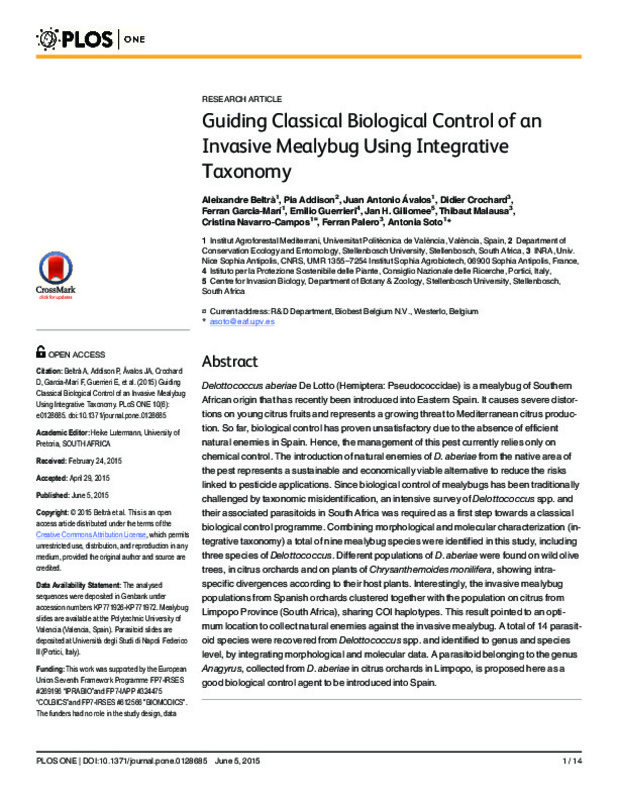Beltrà Ivars, A.; Addison, P.; Ávalos Masó, JA.; Crochard, D.; García Mari, F.; Guerrieri, E.; Giliomee, JH.... (2015). Guiding Classical Biological Control of an Invasive Mealybug Using Integrative Taxonomy. PLoS ONE. 10(6):1-14. https://doi.org/10.1371/journal.pone.0128685
Por favor, use este identificador para citar o enlazar este ítem: http://hdl.handle.net/10251/64101
|
Título:
|
Guiding Classical Biological Control of an Invasive Mealybug Using Integrative Taxonomy
|
|
Autor:
|
Beltrà Ivars, Aleixandre
Addison, Pia
Ávalos Masó, Juan Antonio
Crochard, Didier
 García Mari, Ferran
Guerrieri, Emilio
Giliomee, Jan H.
Malausa, Thibaut
Navarro Campos, Cristina
Palero, Ferran
García Mari, Ferran
Guerrieri, Emilio
Giliomee, Jan H.
Malausa, Thibaut
Navarro Campos, Cristina
Palero, Ferran
 Soto Sánchez, Antonia Isabel
Soto Sánchez, Antonia Isabel
|
|
Entidad UPV:
|
Universitat Politècnica de València. Departamento de Ecosistemas Agroforestales - Departament d'Ecosistemes Agroforestals
Universitat Politècnica de València. Instituto Agroforestal Mediterráneo - Institut Agroforestal Mediterrani
|
|
Fecha difusión:
|
|
|
Resumen:
|
[EN] Delottococcus aberiae De Lotto (Hemiptera: Pseudococcidae) is a mealybug of Southern African origin that has recently been introduced into Eastern Spain. It causes severe distortions on young citrus fruits and represents ...[+]
[EN] Delottococcus aberiae De Lotto (Hemiptera: Pseudococcidae) is a mealybug of Southern African origin that has recently been introduced into Eastern Spain. It causes severe distortions on young citrus fruits and represents a growing threat to Mediterranean citrus production. So far, biological control has proven unsatisfactory due to the absence of efficient natural enemies in Spain. Hence, the management of this pest currently relies only on chemical control. The introduction of natural enemies of D. aberiae from the native area of the pest represents a sustainable and economically viable alternative to reduce the risks linked to pesticide applications. Since biological control of mealybugs has been traditionally challenged by taxonomic misidentification, an intensive survey of Delottococcus spp. and their associated parasitoids in South Africa was required as a first step towards a classical biological control programme. Combining morphological and molecular characterization (integrative taxonomy) a total of nine mealybug species were identified in this study, including three species of Delottococcus. Different populations of D. aberiae were found on wild olive trees, in citrus orchards and on plants of Chrysanthemoides monilifera, showing intra-specific divergences according to their host plants. Interestingly, the invasive mealybug populations from Spanish orchards clustered together with the population on citrus from Limpopo Province (South Africa), sharing COI haplotypes. This result pointed to an optimum location to collect natural enemies against the invasive mealybug. A total of 14 parasitoid species were recovered from Delottococcus spp. and identified to genus and species level, by integrating morphological and molecular data. A parasitoid belonging to the genus Anagyrus, collected from D. aberiae in citrus orchards in Limpopo, is proposed here as a good biological control agent to be introduced into Spain.
[-]
|
|
Palabras clave:
|
Delottococcus aberiae
,
Taxonomy
,
Parasitoids
,
Citrus
,
Molecular
|
|
Derechos de uso:
|
Reconocimiento (by)
|
|
Fuente:
|
PLoS ONE. (issn:
1932-6203
)
|
|
DOI:
|
10.1371/journal.pone.0128685
|
|
Editorial:
|
Public Library of Science
|
|
Versión del editor:
|
http://dx.doi.org/10.1371/journal.pone.0128685
|
|
Código del Proyecto:
|
info:eu-repo/grantAgreement/EC/FP7/269196/EU/Integrating new practices in programs of Biological Control against Agricultural pests/
info:eu-repo/grantAgreement/EC/FP7/324475/EU/Intersectoral Collaborations to Boost Research and Development Dynamics in Biological Control of Agricultural pests/
info:eu-repo/grantAgreement/EC/FP7/612566/EU/Biological Control as a model system to investigate the factors affecting the establishment and dynamics of introduced populations/
|
|
Descripción:
|
The analysed sequences were deposited in Genbank under accession numbers KP771926-KP771972. Mealybug slides are available at the Polytechnic University of Valencia (Valencia, Spain). Parasitoid slides are deposited at Università degli Studi di Napoli Federico II (Portici, Italy).
|
|
Agradecimientos:
|
This work was supported by the European Union Seventh Framework Programme FP7-IRSES #269196 "IPRABIO" and FP7-IAPP #324475 "COLBICS" and FP7-IRSES #612566 "BIOMODICS". The funders had no role in the study design, data ...[+]
This work was supported by the European Union Seventh Framework Programme FP7-IRSES #269196 "IPRABIO" and FP7-IAPP #324475 "COLBICS" and FP7-IRSES #612566 "BIOMODICS". The funders had no role in the study design, data collection and analysis, decision to publish, or preparation of the manuscript.
[-]
|
|
Tipo:
|
Artículo
|









